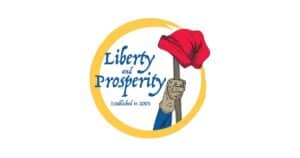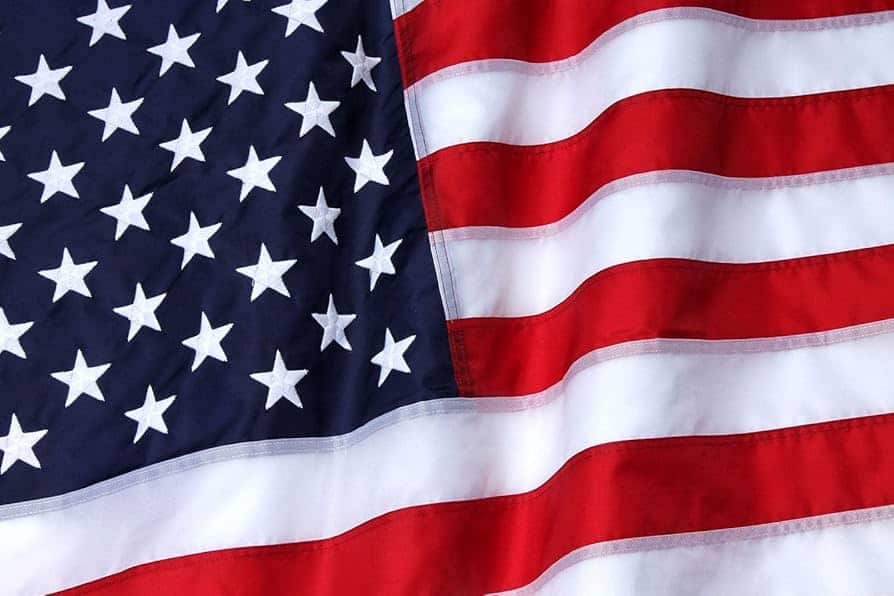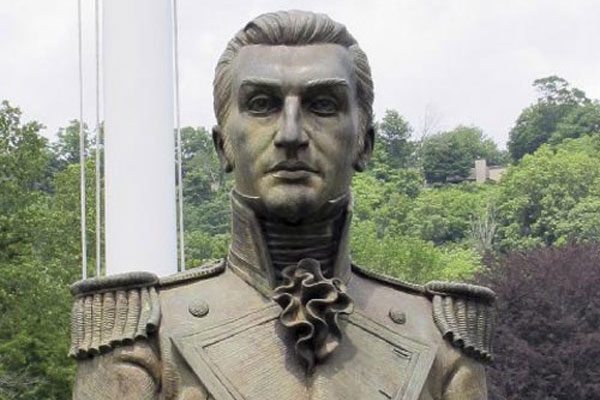
Above Image: Statue of Richard Somers erected in Somers Point, NJ in 2013. An identical statue was previously erected in Somers, New York. Both monuments were created by sculptor Luigi Badia.
First written and produced by LJ Severt in 2013. Later modified with the help of Seth Grossman and performed again in 2022. Updated again for performance on September 4, 2023 and August 21, 2024.
© 2022, Linda J Severt and 2023 and 2024, Linda J. Severt and Seth Grossman
CHARACTER LIST
RICHARD SOMERS, 16 thru 27 years, full of youth and enthusiasm
NARRATOR, a historian
GRANDFATHER SOMERS
GRANDMOTHER SOMERS
COMMODORE JOHN BARRY
PRESIDENT THOMAS JEFFERSON
CAPTAIN EDWARD PREBLE
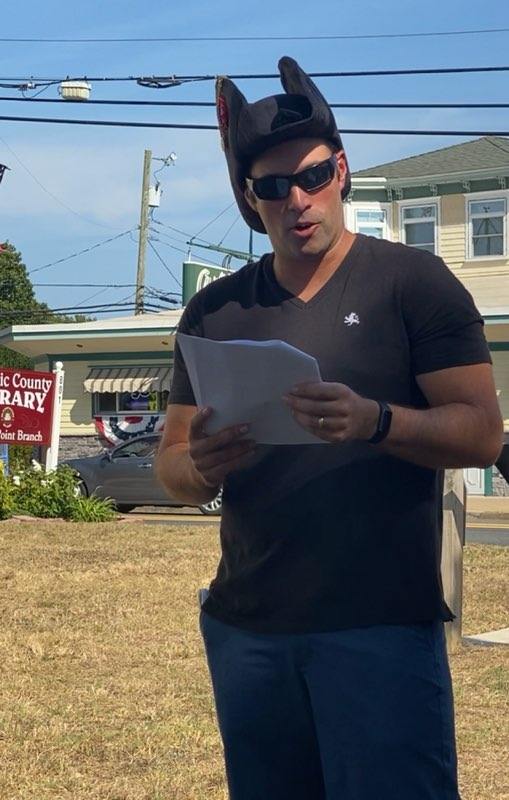
Above Image: Bryan Fitzherbert reads part of Richard Somers on September 4, 2022.
I’m Richard Somers. I was born here in Somers Point on September 15, 1778. A bronze sign a few blocks that way (pointing North along Shore Road) marks where my dad’s house and tavern once stood. That old brick house on the hill over there (pointing South along Shore Road) was built by my great-grandfather John Somers.
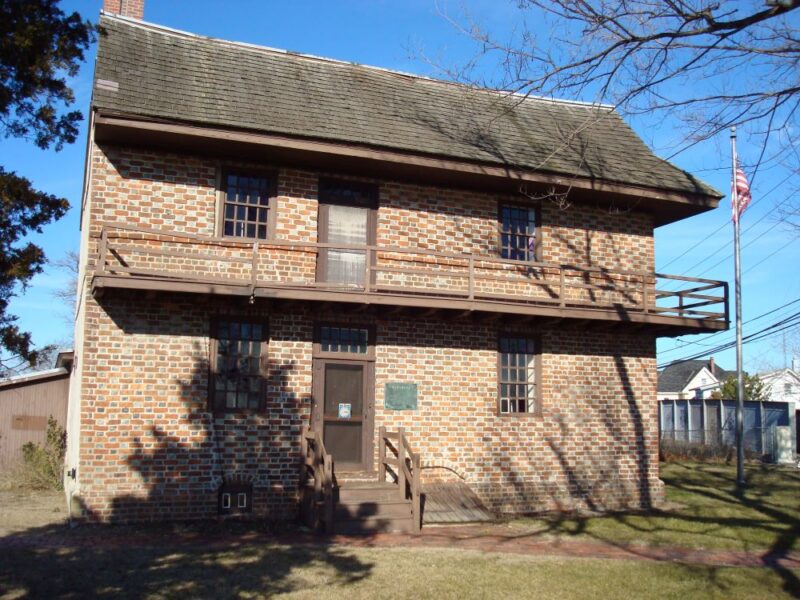
I often came to that house every summer. There, I could feel the ocean breezes as I looked at where the Great Egg Harbor River met the Atlantic Ocean. All sorts of ships sailing between New York and Philadelphia often cut into that inlet to buy fresh eggs, fruit, and produce from the farmers around here. I understand why the old man built such a big and sturdy house there.
GRANDFATHER SOMERS
I plan to leave that house to my sons.
GRANDMOTHER SOMERS
And our daughters…
GRANDFATHER SOMERS
Yes, Mother, to our sons and daughters and their children and grandchildren. Many of them will have our Somers name. Some will have the names of our Quaker neighbors, like Smith, Risley, Scull, Steelman, Conover and Leeds.
RICHARD
(Points towards Beasley Point)

That’s Job’s Point, named after Job, my Great Uncle. He ran the Somers’s Ferry that ran back and forth across the River to and from Beesley’s Point on the other side. From there, you could ride on the Stagecoach Road on the other side all the way to the town by the Cape they named after Captain May. If you close your eyes, you can see it just like I remember it. A wide flat boat with a tiller and oars, loaded with passengers, wagons, coaches, and barrels and boxes of goods… The fare was 12 pence a crossing!
On hot July nights, my older brother Constant and sister Sarah would take a round-trip ride just to cool off. Oh, it was a grand time to be a boy by the shore in the summer.
But today you see me standing here in spirit, a grown man of twenty-four with the heart of a boy. I want to run down the hill and swim in the bay. And then run over the old tavern built by my father, Captain Richard Somers. There I could dry off and share a pint of ale with some old salts.
GRANDMOTHER SOMERS
Richard, are you having lunch with us?
RICHARD
I would love to Grandmother, but, well, this is my last day and I thought I’d run down to Dad’s old tavern for a farewell toast with the old salts I’ve been wetting my whistle with all summer…
GRANDMOTHER SOMERS
Wetting your whistle? What ‘s this whistle-wetting nonsense?
GRANDFATHER SOMERS
Say, Boy, I dare say I would like to join you in a bit of that.
GRANDMOTHER SOMERS
You will not! Summer is over and this is our last family day with all of us together.
GRANDFATHER SOMERS
Now, Mother– that’s what those old sailors call having a harmless pint of ale.
RICHARD
Back then, most 16 year old American boys like me had finished school, which back then had only eight grades. However, I bet we were better educated after eight years of school than most kids coming out of college today.
And besides finishing school, most of us had mastered trades and were supporting ourselves. Benjamin Franklin was a printer running a newspaper when he was sixteen. George Washington was a surveyor mapping out hundreds of miles of unsettled woods. I was 17 when they put me in charge of ships sailing between New York and Philadelphia. Of course I was old enough for a pint of ale in my Dad’s old tavern.
GRANDMOTHER SOMERS
Just be sure you two are home for supper. I made all of Richard’s favorites.
RICHARD
You see. my parents died when I was three, so I spent most of my time with my married sister in Philadelphia. What grieves my grandmother is that tomorrow I will ride to meet Commodore John Barry in Philadelphia. There, he will give me orders putting me in command of my own warship.

COMMODORE JOHN BARRY
I am John Barry. I commanded warships at sea and soldiers on land during all eight years of America’s War for Independence. As soon as the war was over, we sent almost all of our soldiers home and got rid of our whole navy! We Americans were so childish. We thought that if we did not trouble anybody else, nobody else would cause trouble for us.
Getting rid of our navy was a big mistake. As soon as we did it, our fishing boats and merchant ships were attacked all over the world. The Turks attacked our ships hundreds of miles away from their ports in North Africa. French pirates attacked our ships in the Caribbean. Then even the British stopped our ships and kidnapped our sailors for their navy. We often had to pay bribes to be left alone or to get our people back.
After fifteen years, Americans finally had enough. We came up with a new slogan, “Millions for defense. Not one cent for tribute”. Congress then spent the money we had been spending on bribes to build new warships instead. President George Washington asked me to come back to rebuild our navy.
While our new warships were being built, I invited the best sailors in America to sail on my flagship and train to be navy officers. My favorites were three boys I knew from when I taught at the Episcopal Academy in Philadelphia. They were Stephen Decatur, from Maryland, Charles Stewart from Philadelphia, and Richard Somers from South Jersey. They were all nineteen years old. Each had a love and a gift for sailing.
I gave them on-the-job training fighting and whipping French warships in an undeclared war in the Caribbean in 1798. Decatur, Somers and Stewart showed outstanding leadership, bravery, and skill.
It is now 1803 and I’m 58 years old. I’ve been sick for months and won’t be around much more. I just issued orders for Richard Somers to fit out and take command of our newest ship. It is the 87 foot Nautilus, just launched in Baltimore. It has 6 cannons and a crew of 103 men. Somers will sail that ship to Spain and buy fresh supplies. Then he will join Ed Preble and the rest of our fleet off the coast of North Africa. There, they will fight the Turks.
GRANDMOTHER SOMERS
Oh, but Richard, why are we fighting people so far away?
RICHARD
It’s a long story, Grandmother. A story that goes back a thousand years!
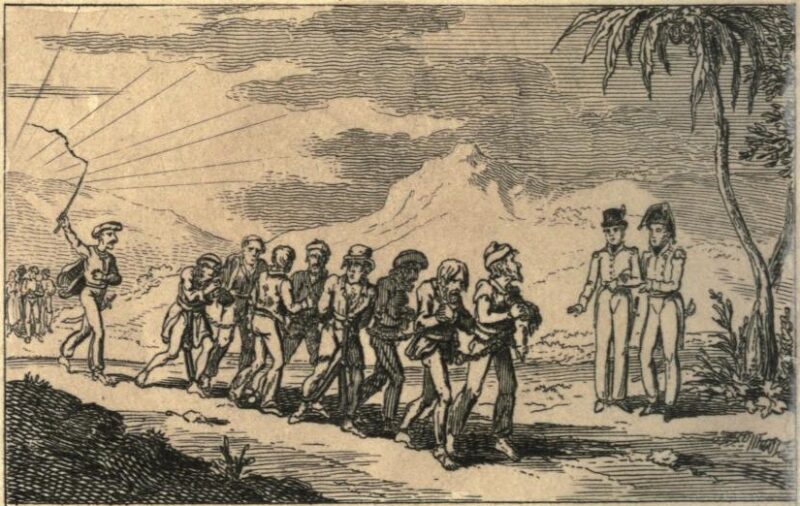
GRANDFATHER SOMERS
Yes, for a thousand years, there were constant wars between Muslims from North Africa and Christians in Europe. Muslim warships attacked Christian ships and coastal villages as far north as Iceland. They took away everything of value they could bring back to Africa. That included people, who they sold as slaves. I met some who were lucky enough to get ransomed and set free. It was horrible. Many slaves were chained next to the oars that moved Turkish ships when there was not enough wind. Those galley slaves were usually dead in just a few months. Very few of your history books mention these details.
They usually call the people who did this Barbary Pirates. In my day we called them Turks. At that time, the Sultan, or ruler of the Ottoman Turkish Empire was also the Caliph, or religious leader of every Muslim in the world. He gave permission to do this.
RICHARD
Before we won our independence, those Turks or Barbary Pirates never bothered us. We were protected by the British navy.
GRANDFATHER SOMERS
Aye, and also by their tribute. The British also paid bribes to be left alone.
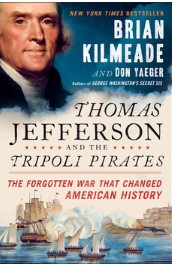
THOMAS JEFFERSON
I am Thomas Jefferson. Before I was President, I was the American ambassador to France. John Adams was our Ambassador to England. When we made peace with England in 1783, our next big job was to make a deal with the Turks. They attacked our ships and robbed and captured our people as soon as they found out we were no longer part of the British Empire.
We had no idea why they were doing this. We were a new nation 5,000 miles away. We had never done them any harm.
After three years, we finally met their ambassador. He was Sidi Haji Abdrahaman from Tripoli. He was well-educated and spoke perfect English. Yet what he said shocked us.
He said “We believe in the Prophet Mohammad. It is written in our Koran that all nations which do not acknowledge our Prophet are sinners. It is therefore the right and duty of every faithful Muslim to plunder and enslave non-believers. Every Muslim killed in this warfare is sure to go to paradise.”
He told us that our ships and people would not be safe unless we paid all four Barbary Kingdoms large bribes, or tribute every year.
GRANDMOTHER SOMERS:
So what did you do?
THOMAS JEFFERSON
John Adams and I wrote a letter to Congress. We urged them to build a navy and send warships to protect Americans.
However, they refused. At that time, America was a confederation of thirteen independent states. Our national government had no Constitution, no President, no navy, and very little money. We were told to make the best deals we could with the little money Congress could scrape up. hat’s what we did. For the next 15 years, ten percent of our national budget was for bribes and tribute to those four Barbary kingdoms.
Ten years later, everything was different when John Adams and I came back to America. We had a Constitution and strong President—George Washington. He and our next President, John Adams built a new navy. When I became our third President in 1801, I sent that navy overseas to protect Americans.

Above Image: The USS Nautilus during the August, 1804 Battle of the Gunboats. It carried 6 heavy cannons and a crew of 103 men. It was launched in Baltimore the year before and put under the command of Richard Somers, then 24 years old.
RICHARD
When I took the Nautilus overseas, I met a lot of British, French, and Spanish navy officers. They didn’t think much of us Americans. They couldn’t believe how young we were. They had been fighting the Turks for years before we got there. Even Edward Preble, my commander, called us a “pack of boys”. But we had something no other navy in the world had — Americans. We picked and promoted our officers based on talent and achievement, not political or social connections. We Americans grew up learning to think for ourselves. We did not blindly follow orders that made no sense. We Americans were better fed, taller, and stronger than most Europeans. We Americans used new designs and methods to build our warships. They were the fastest and most agile in the world. Our Commander, Edward Preble, knew how to bring out the best in us.
In one short year, we won battle after battle against the Turks. Pope Pius VII even praised us. He said that “The United States, though in their infancy, did more to defend Christendom from the barbarians of the African coast than all the European powers.”.
By September of 1804, all of the Barbary Kingdoms had made peace with America except one – the Barbary Kingdom of Tripoli.

EDWARD PREBLE
In August of 1804, our entire fleet attacked Tripoli. My flagship came in close. Our cannons did heavy damage to the castle and forts guarding the city.

Meanwhile, a fleet of small gunboats led by Richard Somers and Stephen Decatur destroyed or captured a half dozen enemy ships at the harbor entrance. The ruler of Tripoli ordered the rest of his ships to retreat to the inner harbor. He decided to wait until most Americans got tired of the war and went home.

PRESIDENT THOMAS JEFFERSON
The ruler of Tripoli knew what he was doing. Congress and the rest of America were tired of fighting a war so far away. We had bigger problems here at home. Napoleon made himself a dictator in France and was fighting a world war against England. During that war, France took over Spain and most of its land west of the Mississippi River. The French called all that land Louisiana. Every farmer west of the Appalachian Mountains now needed French permits to move their products on the Mississippi River. I sent ambassadors to France to make a deal. Then, in 1803, we got a pleasant surprise. Napoleon had some bad luck and suddenly needed lots of cash. He offered to sell us all the French land in North America for just $15 million. It was a bargain we couldn’t refuse. However, we could not afford it if we also had to pay for an expensive foreign war.
EDWARD PREBLE
Although we were winning every battle, everyone on our ships knew that time was working against us. If we were ordered to end the war before we defeated Tripoli, the other Barbary Kingdoms would break their treaties and attack our ships again. All the fighting and dying we had done for the past three years would be for nothing.

RICHARD SOMERS
Eight months before, my friend Stephen Decatur captured a Turkish ketch, a small sailing ship called a ketch. We cleaned it and renamed it the Intrepid. Six months earlier, we used it to sneak into Tripoli Harbor and destroy the Philadelphia. That was a big American warship that the Turks had captured and were about to use against us. I proposed using the Intrepid again. My plan was to pack the Intrepid with explosives, sneak it into Tripoli harbor again, and sail it close to the enemy fleet. We would light the fuse at the last minute, and escape on rowboats. After the explosion, the rest of our fleet would sail into the harbor, seize the castle controlling the city, free American prisoners there, and end the war.
CAPTAIN EDWARD PREBLE
This was not a new plan. Many of us had talked about doing this for months. However, Richard Somers worked the plan down to every detail. He also volunteered to lead the mission. At the end of August, I let him go forward with it.
RICHARD SOMERS
For days, we stuffed the Intrepid with every explosive we had on hand. We made the ship a floating volcano. Once ignited, it would destroy everything around it. We all knew how dangerous this mission would be. Yet dozens volunteered. I chose 12 of them. On September 4, 1804, we sailed the Intrepid into Tripoli Harbor as soon as it got dark.

NARRATOR
Forty-five minutes later, there was a thunderous series of explosions that lasted for a full minute. Everyone knew that the ship had exploded far too soon. The mission had failed.
RICHARD
When the pieces of our bodies washed ashore the next morning, the ruler of Tripoli let his dogs loose on us. I and Lieutenant Wadsworth, my second in command, were identified as the two officers by the buttons and bits of our uniforms that clung to our bodies, and by the smoothness of our hands. The graves for us and our crew were dug outside the fortress walls by captured American prisoners. Years later, our bodies were moved to a nearby Protestant cemetery.
EDWARD PREBLE
One week later, two warships from the United States arrived. One of them carried a new Commodore who was there to take my place. He had lots of ransom and tribute money. He had orders to use it to make a treaty, end the war, and bring everybody home. Every officer and sailor on our ships was angry and ashamed. We were afraid that everything we had done for the past three years had been in vain. But we were wrong.
RICHARD SOMERS
Nobody seems to know the details. However, not all of the ransom money was used by the new Commodore to pay ransom. Some was used to hire a small army of Christian Greek soldiers in Egypt. They were led by Lieutenant Presley O’Bannon and six of the first U.S. Marines. Six months later, they marched 500 miles and captured the port city of Derna, halfway to Tripoli. Then they marched to the Shores of Tripoli itself and threatened to storm the city and overthrow its ruler. That led to a peace treaty with Tripoli on honorable terms. Ten years later, in 1815, Stephen Decatur, now a Commodore of his own fleet, returned to the Mediterranean. There Decatur, with help from other European powers, broke the power of all four Barbary Kingdoms.
The bravery, skills, and perseverance of the young Americans who fought and died with me became known throughout the entire Islamic world. The fear and respect we earned for America saved countless American lives around the world for the next 175 years.
When you remember me, please also remember the names of the twelve others who died with me on the Intrepid, on the night of September 4, 1804.
(As death bell knells)
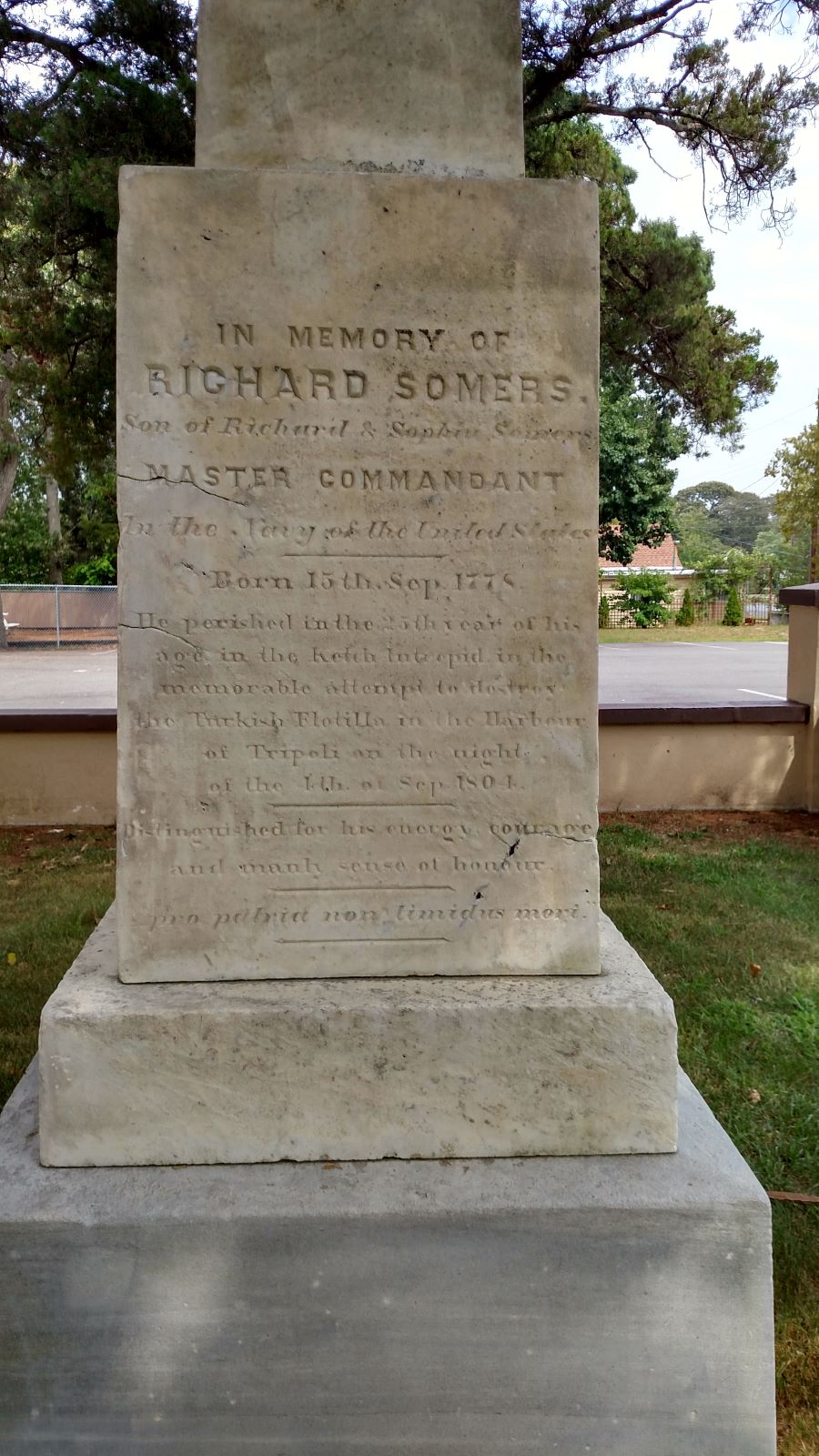
Above Image: The original monument built in the 1800s to remember Richard Somers. It stands in Somers Point near the old elementary school by New York Avenue and the Bike Path.
Acting Lt. Midshipman Henry Wadsworth from Portland Maine. His nephew, American poet Henry Wadsworth Longfellow, was born after his death and named after him. Acting Lt. Midshipman Joseph Israel from Annapolis Maryland, Quartermaster James Harris from Baltimore Maryland, Gunner’s Mate James Simms, Boatswain’s Mate William Keith, enlisted from Annapolis Maryland, Able Seaman Thomas Tompkins from Norfolk Virginia, Seaman William Harrison, enlisted from Boston, Able Seaman Isaac W Downs, Able Seaman Hugh McCormick, Seaman Robert Clark, Seaman Peter Penner, and Seaman Jacob Williams, all enlisted from the Port of New York
END OF PLAY
